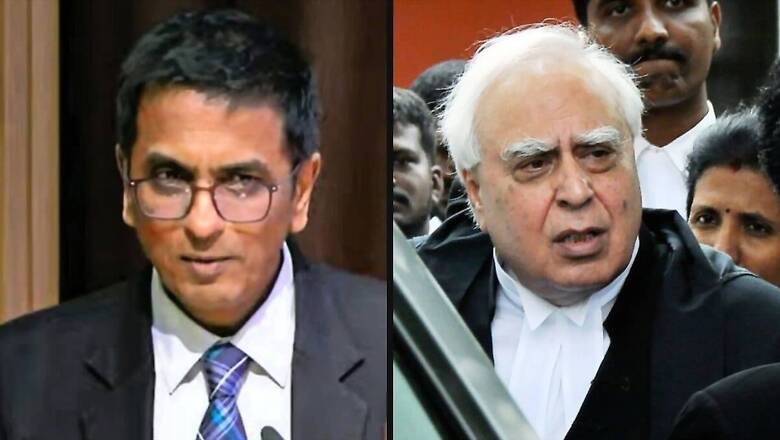
views
Amid the arguments before a constitution bench of the Supreme Court on Tuesday over pleas challenging abrogation of Article 370, senior advocate Kapil Sibal brought in a statement of former Chief Justice of India (CJI) Ranjan Gogoi, which raised doubts on the basic structure doctrine.
“One of your esteemed colleagues has said that in fact the basic structure theory is also doubtful,” said Sibal, while advancing submissions before a bench comprising CJI DY Chandrachud, Justices Sanjay Kishan Kaul, Sanjiv Khanna, BR Gavai, and Surya Kant.
Responding to it, CJI Chandrachud, who was heading the bench, said, “Mr. Sibal, when you refer to a colleague, you have to refer to a sitting colleague. Once we cease to be judges, they’re opinions, not binding facts or diktats.”
Solicitor General Tushar Mehta appearing for Central government, too, interjected, saying, “Parliament does not discuss what happens in court and court does not do so… everyone has the freedom of speech and expression.”
THE BASIC STRUCTURE DOCTRINE
Gogoi, a nominated member in Rajya Sabha, during the debate on Delhi Services Bill on Monday, said that the basic structure of the Constitution has a “debatable jurisprudential basis”. “The law may not be to be my liking but that does not make it arbitrary. Does it violate the basic feature of the Constitution? I have to say something about the basic structure. There is a book by [former Solicitor-General of India] Andhyarujina on the Kesavananda Bharati case. Having read the book, my view is that the doctrine of the basic structure of the Constitution has a debatable, very debatable jurisprudential basis. I would not say anything more than this,” he said.
The basic structure doctrine mandates the court to review and restrict Parliament’s powers to amend the Constitution’s foundational principles. When Gogoi was the judge of the Supreme Court, he had invoked the same doctrine in key cases.
#WATCH | Rajya Sabha MP and former CJI Ranjan Gogoi on The Government of National Capital Territory of Delhi (Amendment) Bill, 2023"…I am concerned as a nominated member not belonging to any political party, I am only concerned with whether the bill is constitutionally valid,… pic.twitter.com/RO03S42uy6
— ANI (@ANI) August 7, 2023
ARTICLE 370: TEMPORARY OR PERMANENT?
Sibal, who is representing the petitioners, began his submission by citing the speech given by Union Home Minister Amit Shah in 2019, while the abrogation was being introduced in the Parliament. “This is important to read and then the presidential notification came. So it’s just not interpretation, but superceding of certain provisions,” Sibal said.
Sibal further questioned whether the Union of India could, in this manner, terminate a relationship recognised in the Constitution of India. “So your argument would be that proceedings of the Constituent Assembly would indicate a reaffirmation of the arrangement under Art 370 as a long-term arrangement,” the CJI responded.
“Yes,” responded Sibal. The CJI responded saying, “Now as per your arguments, there are two ways that we can deal with this — one, though placed in Part XXI, Art 370 was never intended to be temporary. Two, though temporary, the reason it was placed in Part XXI was pending the decision of Constituent Assembly of J&K, did that require something more, a parliamentary intervention to convert that into a permanent provision.”
“If we assume it’s amendable, then the Constitution has to provide us with the solution,” said Sibal.



















Comments
0 comment